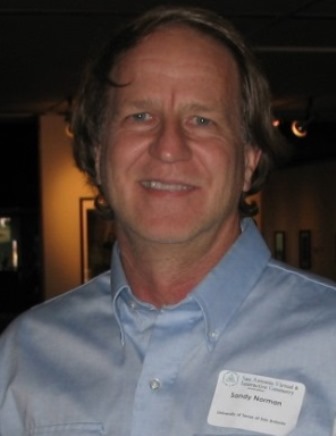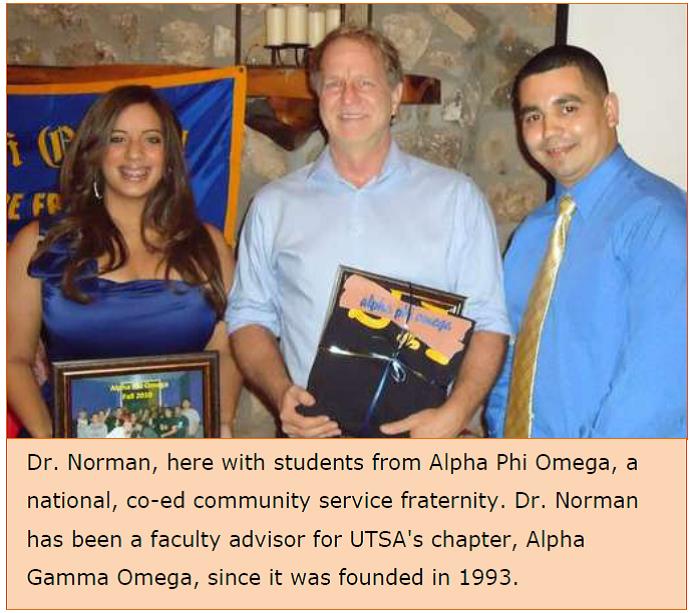
Dr. Sandy Norman
Dr. Norman makes it a point to convey to UTSA faculty members just how vigorously the UT System works to protect their jobs, tenure and good working conditions.
A Balanced Equation
When Support is Given, Support is Received
For most of his adult life, Dr. Sandy Norman has been captivated by mathematics. The Georgia native studied the subject as an undergrad at the University of Virginia, but “couldn’t get enough of it.” So he moved back to Georgia and, in a little more than a decade, earned a master’s degree in the subject from the University of Georgia (UGA), taught middle and high school mathematics, then returned to UGA to secure a doctorate in mathematics education. He then became a professor, in part because he had always been comfortable in academic environments, but also so he could become fully immersed in a discipline that he describes as more like art than any other science. Academia, says Dr. Norman, was, and is, “a natural fit.”
So, too, is Texas. In 1993, after having spent several years as an assistant professor at the University of North Carolina at Charlotte, Dr. Norman and his family moved west when he was offered an associate professor position in the math department at The University of Texas at San Antonio (UTSA). He and his wife, along with their two children and two “vehicular arks” of animals, put down roots on a 100-acre ranch in the Boerne area and have no plans to leave. “My kids moved here when they were very young, so this is their home,” says Dr. Norman, an animal advocate who relishes time spent in the great outdoors.

He also fully appreciates his day job. “I like being at UTSA—it’s a great job and my colleagues have been a joy to work with,” he says. Dr. Norman teaches undergraduate and graduate courses in calculus and geometry; he also reaches out to local teachers and schools to boost pre-college mathematics instruction. “There’s nothing better than seeing young people get excited about something, but in particular about mathematics,” he observes. “When kids get excited, it’s a great experience.”
It was another kind of experience that prompted Dr. Norman to become an active supporter of The University of Texas System. For four years, he was a member of the System Faculty Advisory Council (SYSFAC), which gave him a direct line to the Chancellor of the UT System. “The [Texas] legislature passes laws that have an impact on UT institutions. The Chancellor wants to know how faculty members will respond to those laws,” Dr. Norman explains. Input from faculty is especially critical when the legislation involves things like benefits or working environments or grant opportunities, or if pending laws will directly affect the students they teach. “Faculty members have concerns,” says Dr. Norman and, through the SYSFAC, they are able to share their apprehensions with the Chancellor, the UT System Board of Regents and the UT System’s executive officers.
Likewise, the SYSFAC can be a conduit for a Chancellor who wants to share the “big picture” with faculty members across the state and explain the UT System’s position on issues they care about. When Dr. Norman served as an intermediary, he made it a point to convey to UTSA faculty members just how vigorously the UT System worked to protect their jobs, tenure and good working conditions. The UT System “really does provide the buffer we need between us and other entities that may want to degrade our public education,” says Dr. Norman. “It’s not a perfect system, certainly, but being a part of it does make our lives more stable.”
Through his involvement in SYSFAC, Dr. Norman has drawn many conclusions. Of these, he is most certain of one: the best way to help faculty better understand the importance of the UT System is by getting more faculty involved in it—however challenging that may be. “Educators have a great skepticism when it comes to bureaucracy,” he acknowledges. Still, when more faculty members are aware of the “innumerable ways” in which the UT System defends and advances all aspects of collegiate education, they will return the favor. “I have been very fortunate to have had the opportunity to work with the UT System as I have,” Dr. Norman states. “It has given me the capacity to look at things in different ways, to think about the complete structure that holds up not only ours, but all UT institutions.” It’s self-serving, he concedes, but he “supports the UT System because it supports me.